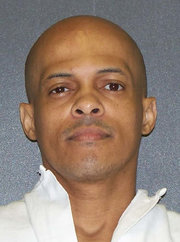After Oklahoma’s botched execution last month of Clayton Lockett led to national hand-wringing over the methods of capital punishment, a Utah state representative believes he has the perfect solution: firing squad.
“It sounds like the Wild West, but it’s probably the most humane way to kill somebody,” said Rep. Paul Ray, a Republican from the northern Utah city of Clearfield, who plans to introduce his proposal during Utah’s next legislative session in January, according to the Associated Press.
While efforts to bring back the firing squad failed in Wyoming and Missouri, as recently as 2010 Utah used the firing squad, when five police officers armed with .30-caliber Winchester rifles executed Ronnie Lee Gardner. Though Utah had eliminated execution by firing squad in 2004 because of the excessive media attention it gave inmates, death-row inmates who had been sentenced before 2004, such as Gardner, still had the option of choosing it.
“The prisoner dies instantly,” Ray told the AP. “It sounds draconian. It sounds really bad, but the minute the bullet hits your heart, you’re dead. There’s no suffering.”
The methods used to kill have been under a microscope across the nation after Lockett’s vein collapsed last month in Oklahoma during lethal injections. He writhed for long minutes until he succumbed to a heart attack 43 minutes later—with officials closing the curtains to block the viewing gallery from the entire spectacle.
While lawyers for death row inmates sense an opportunity in challenging the methods, there is no such second guessing going on in Texas, the execution capital of the world.
Lawyers have been trying to use the Oklahoma debacle to stop Texas from executing Robert James Campbell, a Black man sentenced to die on Tuesday for raping and murdering a woman. But Texas doesn’t accept the possibility that anything could go wrong with its method, which consists of administering a single drug, the barbiturate pentobarbital, instead of the three-drug regimen used in neighboring Oklahoma.
In fact, according to the New York Times, prison officials from other states often travel to Texas to learn from the masters how to perform lethal injections—something about which Texas is very proud—and on a few occasions, Texas officials even carried out executions for other states.
There have been 515 men and women executed by lethal injection in Huntsville since 1982, and all of the 361 inmates Texas electrocuted from 1924 to 1964 were killed in the same prison in the same town. Texas accounts for nearly 40 percent of the nation’s executions.
“In Texas for a substantially long period of time, our citizens have decided that if you kill our children, if you kill our police officers, for those very heinous crimes, that the appropriate punishment is the death penalty,” said Gov. Rick Perry.
“I’m confident that the way that the executions are taken care of in the state of Texas are appropriate,” Perry said on NBC’s “Meet the Press.”
“Texas’s death chamber is a well-honed machine,” Robert Perkinson, the author of “Texas Tough: The Rise of America’s Prison Empire,” a critical history of the Texas prison system, told the Times.
University of Houston law professor David R. Dow, who has represented more than 100 death row inmates during their appeals, said simply: “When you do something a lot, you get good at it. I think Texas probably does it as well as Iran.”



